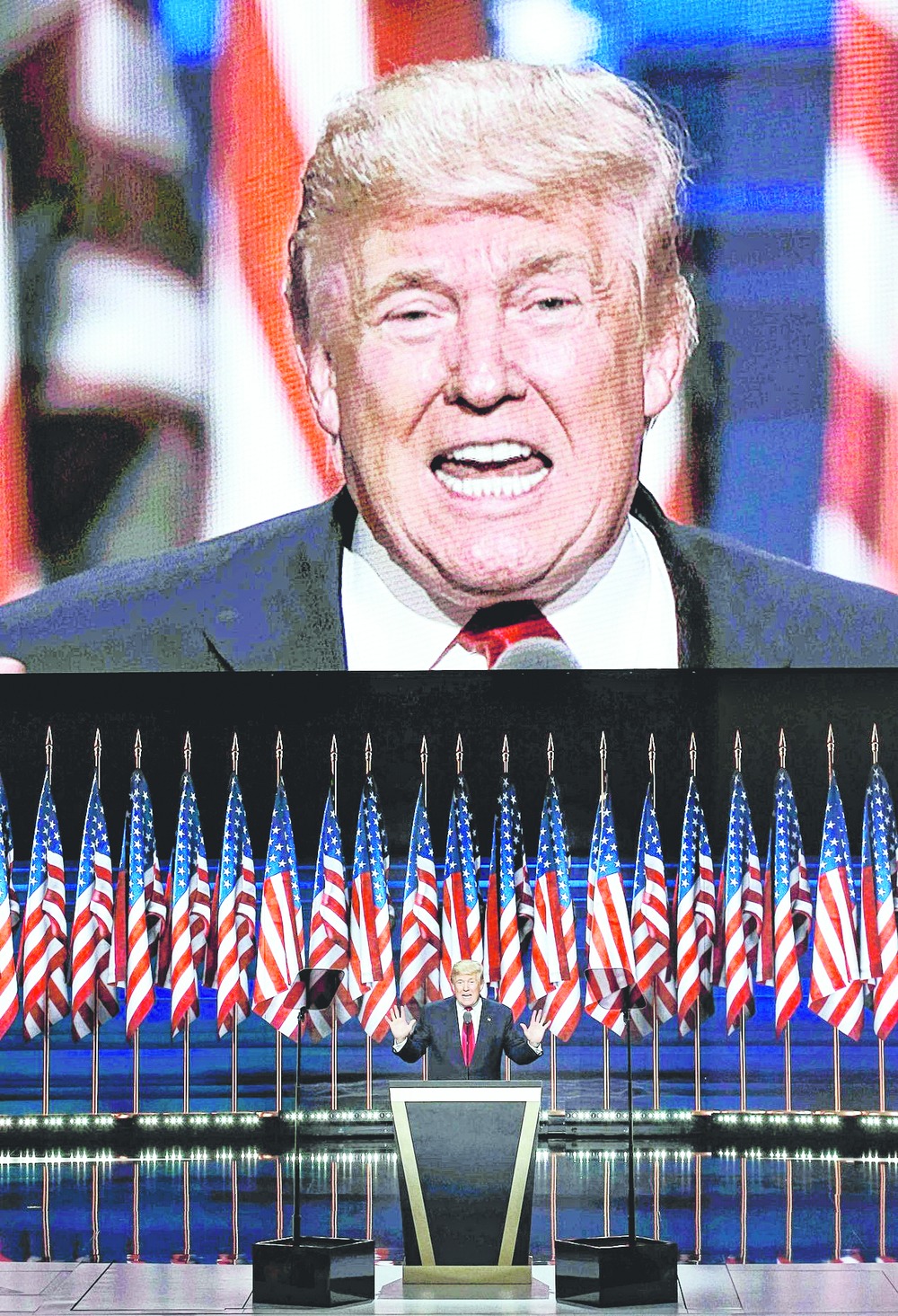
July 22: Donald Trump did not exactly utter these words on Thursday night: "My fellow Americans, be afraid. Be very very afraid." But in accepting the Republican candidacy for the US presidency, this was the message which came through for many of those who listened to the longest acceptance speech by any "Grand Old Party" candidate in nearly half a century.
Trump spoke for an hour and 15 minutes and he roused the faithful who were in abundance at the sprawling Quicken Loans Arena, the party's convention venue in Cleveland. But if voters expected Trump to show America's way to economic prosperity - a recurring theme during his year-long primary campaign for the candidacy - they were disappointed.
Instead, the candidate chose national security and law and order as his main themes. At every turn, he opted for fear-mongering, a strategy which may well get him into the White House during the November election if policemen continue to be killed across US cities at the present pace and scores of innocent people continue to fall victims to gun violence every week.
Without going into specifics on any issue or offering detailed solutions to America's pressing problems, he asked voters to trust him because he had built successful business enterprises.
"I have joined the political arena so that the powerful can no longer beat up people that cannot defend themselves. Nobody knows the system better than me, which is why I alone can fix it," Trump boasted and the party delegates took him at his word.
Trump's acceptance speech, in which he tried to be more inclusive than at any time during the inflammatory primary season, did not heal divisions within the Republican Party. These divisions were dramatically underscored on the penultimate day of the presidential nominating convention when Senator Ted Cruz, a failed opponent of Trump's during the primaries, refused to endorse him in his prime-time speech.
The divisions remained well above the surface even after Trump's acceptance speech: a spokesman for Ohio governor John Kasich, another failed opponent of Trump in the primaries, put out a tweet that the party's candidate delivered the "saddest, darkest, most depressing acceptance speech in modern history".
Kasich boycotted the convention like two ex-Republican Presidents, George W. Bush, his father, the 41st US President, and his brother and former Trump rival and former Florida governor Jeb Bush. It was the first time in history that a governor has boycotted his party's national convention held in the state ruled by him.
Mary Kate Cary, a speechwriter for George H.W. Bush when he was President, also tweeted that Trump's was "a very dark and frightening speech".
There may have been a reason why Trump dwelt on the economy only vaguely and not in great detail. A presidential candidate's acceptance speech would be scrutinised minutely for facts and many of Trump's verbal assaults on the US economy during the primaries were factually way off the mark.
The US economy has actually recovered from the 2008 meltdown under Barack Obama's presidency. Unemployment, which had peaked after the global economic crisis and stood at 10 per cent when Obama came to power, has been cut in half. Trump could acknowledge these only at his peril. Even so, he tried to court African Americans - who are solidly with the Democratic party - by quoting incorrect and inflated statistics about unemployment among blacks.
Out of line for a Republican candidate, Trump also reached out to lesbians, gays, bisexuals and transgenders, offering them protection from attacks by homophobes such as the one in Orlando in June when 49 people were massacred in a gay night club.
But then Trump is not a conventional Republican on issues like abortion and gay rights. The massacre in Orlando also fitted into Trump's portrayal of an America where law and order had collapsed and fear ruled.
Trump talked in chilling tones about recent killings of police officers in state after state in America and of men, women and children fatally run over by a terrorist truck in Nice, France. He promised that once he is elected President, "the crime and violence that today afflicts our nation will soon come to an end". "Beginning on January 20, 2017, safety will be restored."
Trump having set the tone for the general election with his foreboding descriptions of America, the campaign will get under way next month once the Democratic presidential nominating convention formally picks Hillary Clinton as its candidate. The campaign is expected to be vicious, unlike any other in America's past.
This was obvious from repeated chants in Cleveland throughout the Republican convention for Hillary, Trump's opponent to be, to be locked up, even without trial. "Lock her up, lock her up," chanted the party faithful whenever any speaker referred to Clinton in speeches from the convention podium.
With many seasoned Republican leaders staying away from Cleveland, the convention which concluded today was unlike any other: if anyone thought it was a Trump family reunion, they could not be faulted.
On Day One of the convention, the star speaker was Melania Trump, the candidate's wife. On Day Two it was the candidate's son, Donald Trump Jr. On Day Three and Four, the candidate's other children, Eric Trump and Ivanka Trump, spoke at prime time, all of them surrounded, as the cameras focused, by the rest of the family.
Trump broke the convention of the candidate appearing on stage only on the final day to make his acceptance speech. He was there every day, making it clear that the Republican Party is now a Trump family affair.










